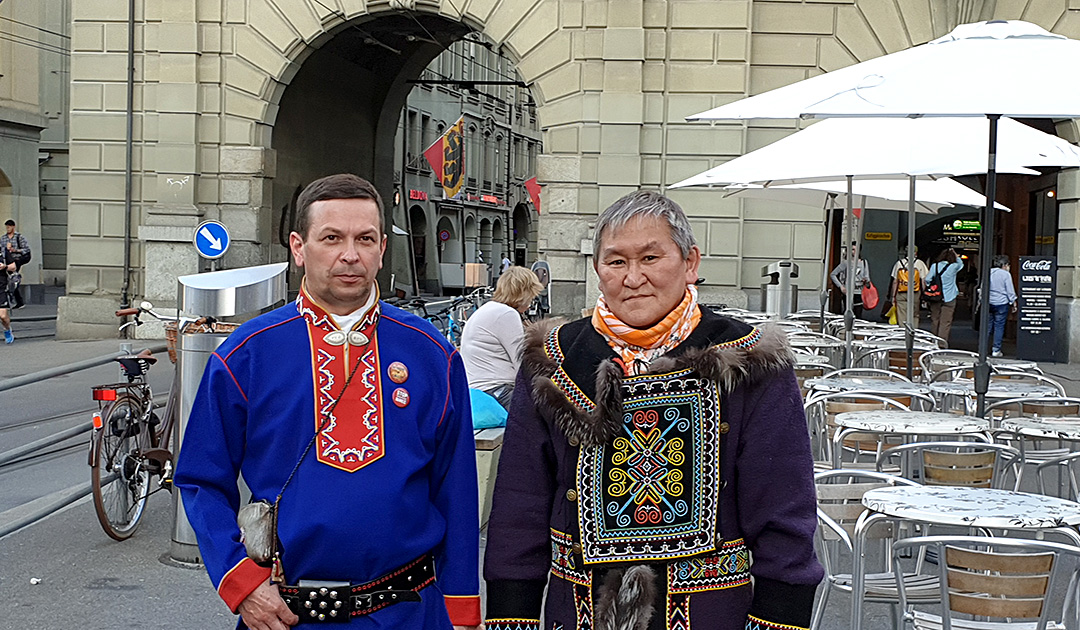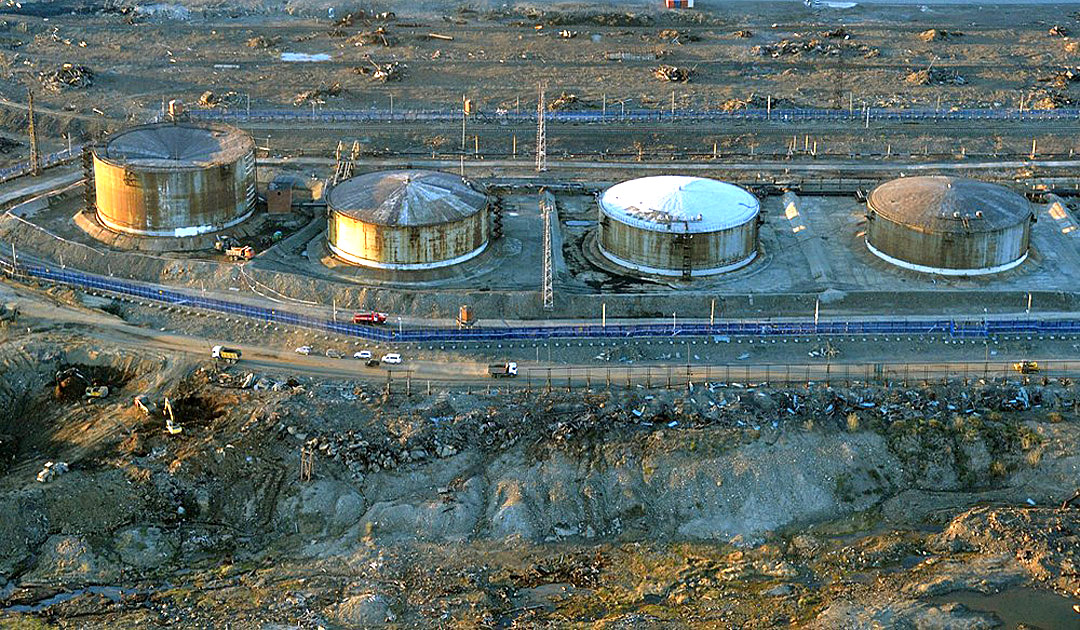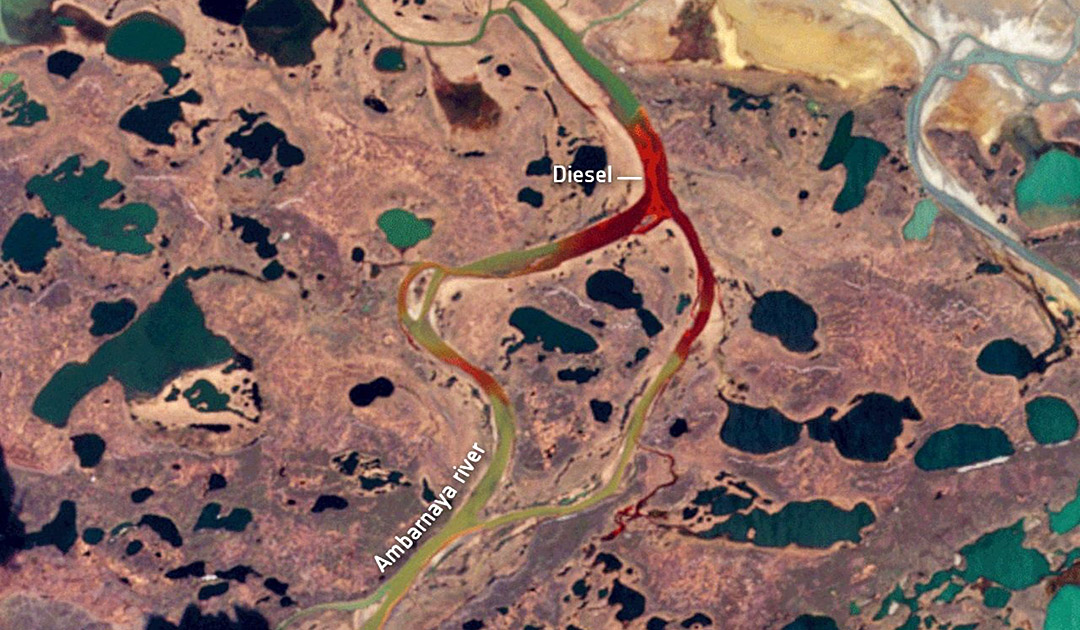
A year ago, a fuel storage tank burst at Norilsk-Taimyr Energy’s No. 3 thermal power plant, flooding rivers in northern Russia with up to 17,500 tons of diesel oil. Indigenous representatives from the far north of Russia recently visited the capital of Switzerland to demand action from the Swiss-based subsidiary of the company responsible, as well as from banks that invest in it.
From: swissinfo.ch – Igor Petrov
Gennady Shchukin, a representative of the Dolgan people, and Andrey Danilov, a delegate of the Sami people on Russia’s Kola Peninsula, appeared at an event organized by the Society for Threatened Peoples in Berne to discuss the consequences of the second largest oil spill in Berne. They called on Norilsk Nickel (Nornickel), the owner of the power plant whose subsidiary is based in the Swiss canton of Zug, to work more closely with their communities to improve the situation.
SWI swissinfo.ch spoke to them about the responsibility of governments and transnational corporations towards small indigenous communities, Russia’s chairmanship of the Arctic Council and the course of the disaster last year.

SWI swissinfo.ch: Why did you come to Switzerland?
Andrei Danilov: The reason for our visit was the company Norilsk Nickel. More specifically, the company’s failure to respect the rights of indigenous peoples and its violation of environmental standards in Russia. Our aim was to draw the attention of the international community to the fact that the company does not respect the rights of indigenous peoples.
So we came to inform the partners of Norilsk Nickel in Switzerland itself, but they refused to meet us.
SWI swissinfo.ch: How serious was the Norilsk Nickel accident?
Gennady Shchukin: President Vladimir Putin also spoke personally and brought the issue to the federal level. But they kept quiet about the disaster for two days. They then had to organise the decontamination of the affected areas and take measures to prevent the fuel from spreading. Of course, they managed to remove most of it from the environment, but much of it ended up at the bottom of the river. And it is very difficult to remove the pollution from there.

SWI swissinfo.ch: What led to the disaster? Outdated infrastructure and equipment?
Gennady Shchukin: It’s about the old technologies left over from the Soviet Union. They’re still in use. In terms of minerals, everything is pulled out of the ground, and this is done until the old machinery just begins to disintegrate. On May 29, 2020, this diesel tank burst. I’m not an environmental engineer, but I can say that once the affected areas were cleaned and reclaimed, there were no fish left. This means that the cleanup was not done well.
It is quite possible that Norilsk Nickel simply does not have the appropriate technology. In this case, part of the responsibility lies with governments. And we’re not just talking about penalties, we’re talking about special programs to protect indigenous communities, the consequences of which must be financed by the state. Because otherwise we simply have no livelihood. We won’t have any fish. We will not be able to survive in Arctic conditions.
SWI swissinfo.ch: What is life like in the far north of Russia and what opportunities are there for dialogue with the government and companies operating there?
Andrey Danilov: Russia’s two-year presidency of the Arctic Council begins now. There are many documents and regulations, including the Arctic Development Strategy to 2035, but they do not even mention indigenous peoples and their interests! These documents mention companies, but nothing at all about people.
Companies and other entities that get money and tax breaks for “development” in the region just end up siphoning resources from the Arctic and don’t even think about engaging in dialogue with indigenous peoples. The documents state that they are “aware” of a dialogue, but do not commit anyone to anything.
During the Soviet period, attention was paid to indigenous peoples because they were politically important to the country as a whole. It was necessary to say, “Look how our state protects the small communities of the north, no one can go there and do what they want without an agreement with the local people and authorities.” And now it’s all being given to corporations.
SWI swissinfo.ch: Do you think your arrival in Switzerland will make a difference?
Gennady Shchukin: I am sure of it. Our partners at the Society for Threatened Peoples have taken us under their wing and are watching out for our safety. They target specific local companies that invest in projects that are implemented in our regions. In general, they will address the problems related to the situation of indigenous peoples of the Russian Far North. So I think there will be a result!
swissinfo.ch: Igor Petrov





